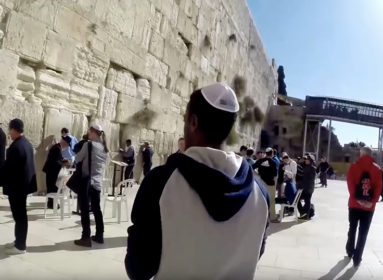ANNAPOLIS, Md.—During a visit to the U.S. Naval Academy last week, Israeli Ambassador to the U.S. Michael Oren stressed both privately and publicly that his country remains committed to working toward the possibility of a two-state solution for Israel and the Palestinians.
“This is a two-state solution, not a two-stage solution with the destruction of Israel as its second stage,” he told 800 future naval officers in Annapolis, Md.
Regarding what he called the “changing Middle East,” Oren said in an interview that Israel sees “both challenges and opportunities.”
“Among Israeli public opinion, a solid majority looks at the situation and realizes that now is not the time to trade concrete assets (land),” he said.
Oren received an enthusiastic standing ovation from the midshipmen — far more cordial than his reception at the University of California at Irvine in 2010, when he was repeatedly booed and heckled. Still, Oren’s denial of Israel’s involvement in the recent targeted assassination of an Iranian nuclear scientist was met with raised eyebrows, incredulous “ahems” and snickers.
“There are people killing people every day in Iran,” Oren told the crowd. “We and the U.S. agree that we are determined to prevent Iran from acquiring and developing nuclear weapons.”
The former paratrooper and Israeli liaison to the U.S. Sixth Fleet underscored the seriousness of the Iranian threat — including Iranian support of terror as well as the recent threat to close the Straits of Hormuz — but said in an interview that the threat “is not existential. Israel can defend itself. It is a monumental threat but not existential. We have the means and the will.”
“All of this Iran is doing without nuclear weapons. Can you imagine what it would do with nuclear weapons?” he rhetorically asked the midshipmen, partially answering by saying it would also set off a regional nuclear arms race.
“The Iranian economy is in a nose dive and its currency has been devalued,” Oren added. “There are cracks and stresses in its leadership.”
Oren said that, “fates of such governments have not been particularly felicitous.”
On the topic of Syria, Oren told the midshipmen “we want Assad to go,” because that would end Iran’s involvement in Syria and dominance of Lebanon. However, he said “we do not want to see Syria fall apart along ethnic lines.”
In an interview, the diplomat noted the Syrian people’s protests. “It’s very inspiring. They protest every day and don’t stop in spite of knowing they might not come home, and we look upon them favorably.”
At the Naval Academy, he said the Israeli and Egyptian militaries and government leaders are in daily contact. “We cherish that peace,” Oren said. “So far, the parties in Egypt, without expressing affection for us, have said they will uphold their treaty with us.”
Oren told JointMedia News Service (JNS) that Israel maintains a military presence along the Jordan River, but that the Jewish state’s problem with Lebanon is not at the Lebanese border with Israel, but the Lebanese border with Syria. Similarly, he said, “Our problem with Gaza is its border with Egypt, not the Egyptian border with Israel.”
Oren emphasized to the midshipmen the unique solidarity of the American-Israeli friendship, stressing that the two nations don’t agree on everything, comparing it to British-American relations during World War II.
“Israel is not only a true friend, Israel is an ally — not just an ally but the ultimate ally,” he said.
Oren described how U.S. ships refuel in Haifa, how the two countries share military and intelligence information daily, and the presence of a U.S. radar station in the Negev. One small kibbutz had developed armoring techniques that were used by 20,000 military vehicles in Iraq, and an Israeli company developed new bandages to stop bleeding in battlefields — technology that was used to treat Congresswoman Gabriella Giffords when she was shot in Tucson, Ariz.
“We are engaged in a serious and consistent dialogue with the American administration to maintain QME — a qualitative military edge,” he said. The goal, Oren said, is to “assure that Israel can defend itself against Mideast adversaries.”
In an interview, Oren specifically mentioned U.S.-Israel cooperation on the F-35 Joint Strategic Fighter, as Israel expects to purchase 19 such jets from Lockheed-Martin.
Oren, a New Jersey native and author of critically acclaimed books about Middle Eastern history and the American encounter with the Arab world, visited the Naval Academy after a busy day in the historic capital of Maryland, meeting with state officials, midshipmen and local community leaders.
Invited by Chezi Brosch, an Israeli specialist in Arabic in the Naval Academy’s Center for Middle East and Islamic Studies, Oren also toured the Banneker-Douglass Museum of African American history, where he noted Maryland’s 2008 divestment law that targeted Iran and Sudan.
“Maryland is important to us,” Oren told JNS. “It is a national leader in commercial ties to Israel and in legislation designed to divert investment in Iran.”
SHARE








 Southern New England Jewish Ledger
Southern New England Jewish Ledger











